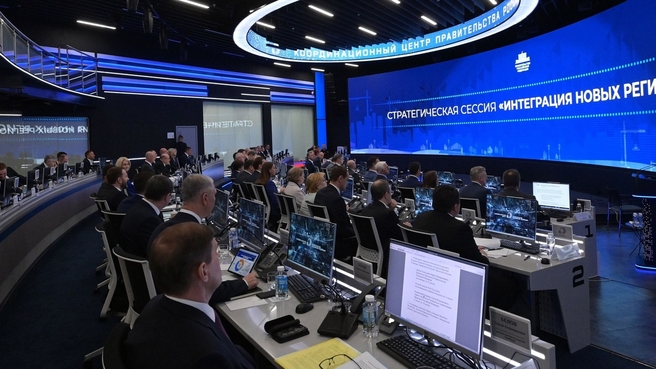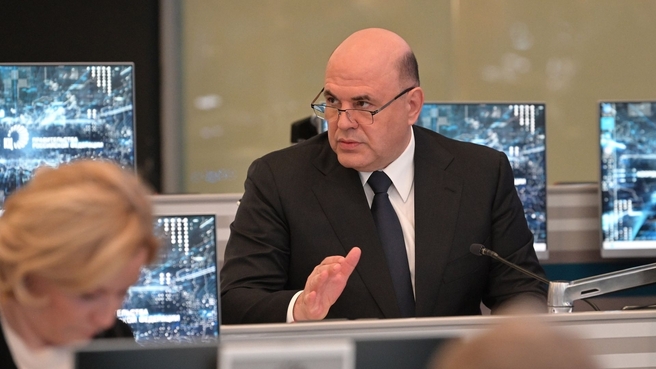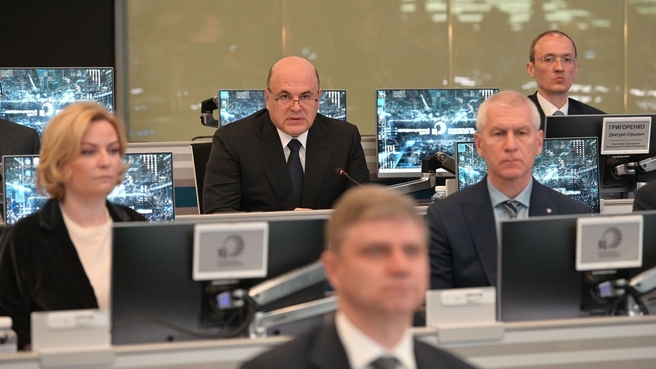Mikhail Mishustin: “It is necessary to implement specific objectives, primarily high wages, benefits and pensions that meet Russian standards. We will have to improve the infrastructure. People should have access to housing, hospitals, outpatient clinics, schools, kindergartens, good roads and sport facilities. It is also necessary to relaunch enterprises and to open new ones.”
Mikhail Mishustin’s opening remarks:
Good afternoon, colleagues.
Today, we will discuss the future development of the Donetsk and Lugansk people’s republics, as well as that of the Kherson and Zaporozhye regions, in great detail and with due consideration for the tasks set for us by the President.
In October 2022, these regions became an inalienable part of Russia. The President instructed us to integrate them into the country’s common economic, legal, educational and cultural space, and to elevate them to Russian standards in the next eight years.
This is the main guideline of our work, which reflects our current priorities and lays down the strategy for our future actions.
In April, the Government approved a programme for the socioeconomic development of the new territories. The programme stipulates large-scale measures for all sectors.
It is necessary to implement specific objectives, primarily high wages, benefits and pensions that meet Russian standards.
We will have to improve the infrastructure. People should have access to housing, hospitals, outpatient clinics, schools, kindergartens, good roads and sport facilities. It is also necessary to relaunch enterprises and to open new ones.
It is important to discuss our current achievements.
First of all, we have rebuilt high-priority social facilities, including over 1,500 blocks of flats, almost 1,700 housing and utility facilities, about 4,500 power industry facilities and almost 800 important social institutions.
We need to ensure connectivity between the new regions and other territories. We have already improved over 800 motorways and 18 bridges.
We have picked up momentum, and we should not slacken our pace. We still have a lot of work to do.
This also applies to the social sphere. As the President emphasised, the most urgent, vital issues must be resolved promptly.
All four new regions should have a social protection system that meets Russian standards. All people in need of assistance – pensioners, disabled persons and families with children, should receive aid from the state in the full amount, comfortably and quickly. The quality of people’s lives directly depends on the implementation of these commitments.
Now, about 1.6 million residents of the new regions receive pensions. Other social payments add up to practically another 1.5 million. I would like to emphasise that it is necessary to provide such support on time. Please monitor this closely.
And one more point. These changes are very sensitive for the residents of these regions, the elderly in particular. So it is necessary to work with people more actively, explain to them how our social protection system works and what they should do to receive different payments. It is very important to explain this to people clearly.
Modernising the economy of the new regions is a separate task. It is necessary to take measures to preserve jobs and production at plants and factories, launch additional capacities and, of course, continue supporting relevant economic sectors. This applies to the agrarian and many other sectors. Incidentally, in the future the agrarian sector may become one of the main drivers for the development and provision of jobs, primarily in the Kherson and Zaporozhye regions.
Equipment for the sowing and harvesting campaigns has been delivered to these two regions. I would like to ask my colleagues to make sure our farmers have everything they need.
Colleagues,
Almost 1.5 million people from the new regions have received Russian passports since last October. It is important for all of their residents to feel real changes taking place in their cities and towns. We have seen that streets and housing are being rebuilt gradually, everyday living conditions are being improved, and new opportunities are being created for education and professional activities. Smooth teamwork at all levels of government is needed to continue all this and reach the target figures we have set in the programme.
Today, we will discuss what additional decisions are needed to reach these results.














